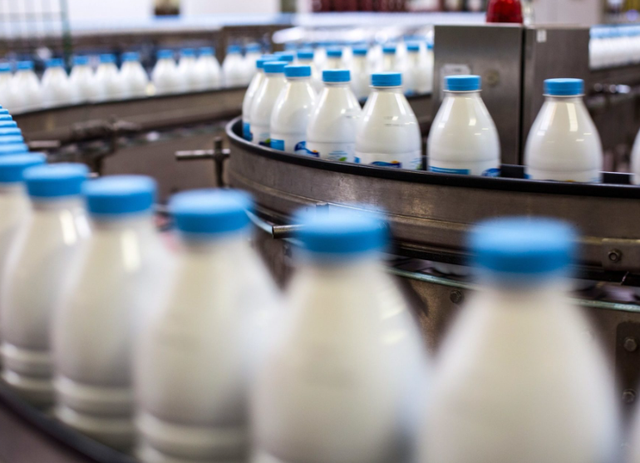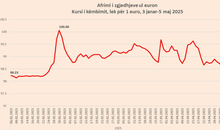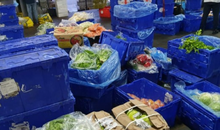
 Flash News
Flash News
Young woman in Korça who denigrated minors on Instagram is hit with a water glass
Conviction charges in Greece: The Prosecution says it has been verifying the "Gjoka" case for 1 year
27-year-old drunk driver hits police officer in Peshkopi
SPAK files another charge against Ajola Xoxa, also accused of concealing income
Young man disappears in Tirana
The decline of the dairy industry, the market is being replaced by imports, increase by 9% in January-February

The amount of milk produced in the country is not meeting the demand of processing factories for the production of dairy products.
The high demand due to the lack of operators' stock and low supply has increased the pressure to increase the price of fresh milk produced by farmers.
Operators claim that with the start of the spring season, sheep's milk is being sold by livestock farmers at a price above 160 ALL per liter, reaching the level of 190 ALL per liter. Worrying for the sector is the high intake of milk from informal dairies.
Failure to meet demand from domestic production has forced companies to import milk. For the months of January-February 2023, imports increased 9% more compared to the same period last year according to Customs data. The upward trend of imports started already in 2022. The total imports of 2022 increased about 2% more than 2021.
Processing companies raise the concern of increasing the price of sheep's milk, but also of cow's milk at levels many times higher than other countries. Currently, according to company data, the price of cow's milk for countries such as Italy, France and Germany has decreased from 68 cents per liter to 58 cents per liter (58.6 ALL per liter), while the average sale price of cow's milk from the local farmer is 75 Lek per liter.
"The demand for milk is high, as all the processors are empty, they have no stored stock. This has led to sheep's milk being sold above the level of 160 Lek per liter without VAT, reaching up to 190 Lek per liter without VAT. Stabilization of cow's milk production appears to be slow, but the pressure to increase the price continues, when in many countries the price has decreased. This situation forces us to import. Not because the price of milk is cheaper abroad, as the high transport fees make the price very expensive, but there is no domestic production", one of the processing companies told Monitor.
For the months of January-February, 46% of milk imports come from Italy, 30% from Serbia, 10% from Kosovo and the rest from other countries.
Shoqata e Industrisë së Përpunimit të Qumështit pohon se aktualisht nuk ka rënie prodhimi, sepse çmimi është shumë i favorshëm për blegtorët, por sasia e prodhuar ende nuk plotëson kërkesën që ka sektori përpunimit.
Shqetësuese mbetet edhe informaliteti i lartë i sektorit. Një nga kompanitë nënvizoi se pranë fabrikës përpunuese në lumin e Vlorës numërohen rreth 25 baxho që operojnë në informalitet, pra që nuk paguajnë TVSH dhe të tjera detyrime, duke i konkurruar në mënyrë të padrejtë. “25 subjektet marrin mesatarisht nga 10 kv qumësht në ditë. Ka edhe nga ato baxho që përpunojnë edhe 30 kv qumësht në ditë. Në total llogariten 250 kv qumësht në ditë që shkon te përpunuesit informal. Fabrikës sonë i mbeten vetëm 10 kv qumësht në ditë. Kjo po dëmton përpunuesit e rregullt, madje duke rrezikuar daljen e tyre nga tregu”.
For the formalization of the market and the increase of domestic production, the companies recommend as a solution only the change of the milk subsidy scheme, by implementing a subsidy per liter so that the farmer is forced to issue/request an invoice and everyone will be formalized.
Meanwhile, the national agriculture scheme for 2023 will continue to support farms with subsidies per head, not for the amount of milk produced, a constant demand of the industry./ Monitor
Latest news


Topalli: Small parties have no chance of getting a mandate
2025-05-05 22:42:40
SP officials in prison for corruption, Rama: We are not a law firm
2025-05-05 22:36:42


Soul-touching hours: Discover when we are saddest and happiest during the day
2025-05-05 21:47:20
Alimehmeti: DP in Tirana gets more than 12 mandates
2025-05-05 21:34:33


Berisha: Rama knows Dibra as much as Toni Gogu knew Hajredin Pasha
2025-05-05 21:01:00





27-year-old drunk driver hits police officer in Peshkopi
2025-05-05 19:50:14
'Giro d'Italia' in Albania, how will vehicle traffic be diverted in Tirana
2025-05-05 19:36:32
Meta: Rama is afraid of losing, that's why he calls for non-participation
2025-05-05 19:25:19


Këlliçi: Let's stop propaganda and return Tirana to the citizen
2025-05-05 18:43:47
Rama deepens scandal, calls again for election boycott
2025-05-05 18:25:53


Indian learns 80 numbers in 13.5 seconds, becomes world champion
2025-05-05 17:50:22

The moral damage of promises, an electoral bubble
2025-05-05 17:23:59
Albanian arrested in France, caught with 11 kg of cocaine
2025-05-05 17:08:22


The best and worst foods for a healthy liver
2025-05-05 16:41:45
Another country lifts visa requirements for Kosovo
2025-05-05 16:28:49



Judicial confrontation with OSHEE, Bardhi is declared innocent
2025-05-05 15:50:40
Bozdo: The panicked SP is preparing vote buying
2025-05-05 15:41:06
Zhupa publishes drone footage: DP will cancel the strategic investment law
2025-05-05 15:37:29

The week starts badly for 3 zodiac signs, here's what the stars predict!
2025-05-05 15:13:53
73-year-old arrested for wounding brother in Malësia e Madhe
2025-05-05 15:04:20



Jonathan Islam falls from a parachute
2025-05-05 14:36:21

Lawsuit filed against Dodik, accused of insulting Bosniaks
2025-05-05 14:12:48


Topalli denounces SP officials: They are manipulating votes in Greece and Italy
2025-05-05 13:49:25
Monika Kryemadhi appears at SPAK dressed in black
2025-05-05 13:24:47


SPAK files another charge against Ajola Xoxa, also accused of concealing income
2025-05-05 12:52:23
Sanctions and war tribunal on the agenda of EU ministers
2025-05-05 12:29:10
Rama insults and offends Bledjon Nallbatin: How can Democrats vote for a thug?
2025-05-05 12:21:41

May 5, National Martyrs' Day
2025-05-05 11:50:22

Kurti invites LDK for coalition with LVV
2025-05-05 11:37:27

Young man disappears in Tirana
2025-05-05 11:14:39

Facebook campaign: Profiles from Vietnam like "Team Edi Rama" posts
2025-05-05 10:52:24
The Special Court leaves Florenc Çapjan in prison, the testimony is revealed
2025-05-05 10:38:24
Fatal accident in Shkodra
2025-05-05 10:25:30
Gunfight in Laç/ One of the injured in serious condition
2025-05-05 10:19:06





Appears in SPAK Sali Berisha
2025-05-05 09:08:23
Përtej gallatës dhe nofkave, çfarë ofron politika për ekonominë
2025-05-05 08:52:58
A 28-year-old wanted by Spain for drug trafficking is arrested in Vau i Dejës
2025-05-05 08:42:24

Rain is back! Weather forecast for today
2025-05-05 08:20:40
Posta e mëngjesit/ Me 2 rreshta: Çfarë pati rëndësi dje në Shqipëri
2025-05-05 08:01:22

Makina përplas motorin në aksin Shkodër-Lezhë, plagosen dy adoleshentë
2025-05-04 21:29:50


Video/ The moment when the police forcibly drag away the DP candidate in Fier
2025-05-04 20:47:17
Berisha: We ask for 100 days from Albanian citizens to transform Albania
2025-05-04 20:38:25



"In the owl sleeps a vigilant fate..."/ Chris LaCivita openly criticizes Rama
2025-05-04 19:09:01
UEFA fines Real Madrid
2025-05-04 18:45:40

Habit Putin: I hope there will be no need to use nuclear weapons in Ukraine
2025-05-04 17:55:59
A 37-year-old man is found dead in the Port of Shëngjin
2025-05-04 17:32:32
Serious accident in Croatia, 2 dead and 31 injured
2025-05-04 17:17:05
Useful during the summer, here are the vitamins you should take
2025-05-04 17:03:11





